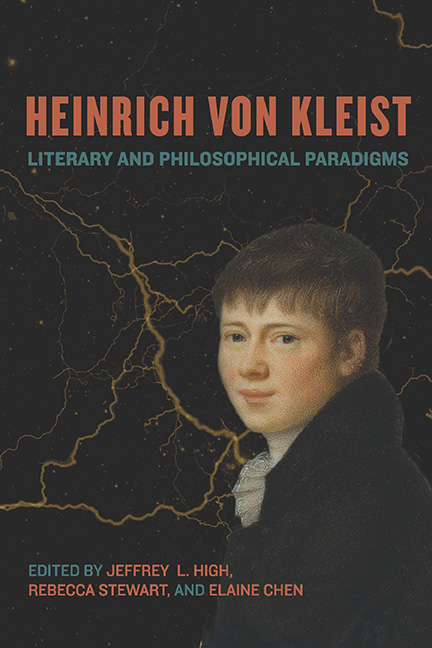1 - In the Beginning: Kleist, Genesis, Kafka, and the Pursuit of Epistemological Salvation
Published online by Cambridge University Press: 26 May 2022
Summary
Die Vertreibung aus dem Paradies ist in ihrem Hauptteil
ein ausserzeitlicher ewiger Vorgang. Es ist also zwar die
Vertreibung aus dem Paradies endgiltig, das Leben in der
Welt unausweichlich, die Ewigkeit des Vorgangs aber oder
zeitlich angesehn die ewige Wiederholung des Vorgangs
macht es trotzdem möglich, dass wir nicht nur dauernd
im Paradiese bleiben könnten, sondern tatsächlich dort
dauernd sind, gleichgültig ob wir es hier wissen oder nicht.
—Franz KafkaLIKE MANY OF HIS contemporaries, predecessors, and successors, Heinrich von Kleist (1777–1811) made frequent allusion to the Bible in his works, evoking situations and quoting passages—often incorrectly—for the sake of resonance, comparison, misdirection, and subversion. Bernd Fischer has characterized this habit as part of a program of “hidden double talk,” an exploitation of the familiar for the sake of providing suggestive alternatives to the apparent direction of the narrative. Thus, the Bible became one of several tools for suggesting epistemological stability while allowing for the possibility of the collapse of knowledge. It functioned as a catalogue of resonant references and a source of gravitas, a weightiness that remained even when the primary referent ceased to matter. This essay is an examination of biblical paradigms in Kleist's work, the structures and stories that figure strongly in Romantic writing in general and very prominently in Kleist's literary production, where familiar bits of Romantic biblical lore undergo significant transformations and reinterpretations. The particular focus here is the Mosaic account of the origin of humankind and its Fall and the three-part progression (Paradise- Fall-Redemption) that fueled much Romantic plotting, and that Kleist appears to distort and parody. As Tim Mehigan notes, Kleist “abandoned the aesthetic and cultural projects” that characterized Romantic writing, moving toward a position of dubiousness about Enlightenment rationality and also about its Romantic opposite. Kleist's take on Genesis and the Fall is inconsistent from work to work, plays to essays to prose narratives, and incompatible with most Christian and Judaic readings. Franz Kafka (1883–1924), as the passage above suggests, seems to have had similar designs on Genesis, indicating that we may always be in paradise whether we know it or not.
- Type
- Chapter
- Information
- Heinrich von KleistLiterary and Philosophical Paradigms, pp. 17 - 29Publisher: Boydell & BrewerPrint publication year: 2022



